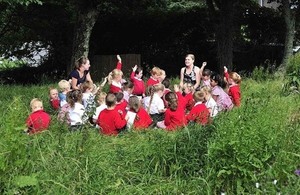The Natural Connections Demonstration project has published new evidence on the benefits of outdoor learning to pupils, teachers and schools.

Children from 125 schools across the South West of England are happier, healthier and more motivated to learn thanks to a new project commissioned by Natural England that has turned the outdoors into a classroom and helped schools transform ways of teaching.
The findings have been released by the Natural Connections Demonstration project, a 4-year initiative to help school children – particularly those from disadvantaged areas – experience the benefits of the natural environment by empowering teachers to use the outdoors to support everyday learning.
The project, which is funded by Natural England, Defra and Historic England and delivered by Plymouth University, is the largest project of its kind in England and has already helped more than 40,000 primary and secondary school pupils get out of their classrooms and into the outdoors – whether that’s a maths lesson in a local park or drama out on the school field.
Environment Minister Rory Stewart said: We learn to love nature as children, and our commitment to nature later in life – respecting it, protecting it, restoring it, or simply enjoying it – is built on that childhood foundation. That’s why it’s so important we give all children the chance to experience the natural world.
What’s clever about this project is it listens to teachers, it works with the grain of an individual school, and it works out how to get children into the outdoors while improving their curriculum experience.
Speaking at Wallscourt Farm Academy in Bristol at the launch of the findings, Natural England’s Chairman, Andrew Sells, said: The Natural Connections project has empowered teachers to make the most of what’s right on their doorstep and helped children experience the joy of the natural environment. It’s brought a real culture change into schools, making learning in the outdoors a regular part of school life – and it’s inspiring to see children more engaged with learning and happier and healthier as a result.
Sue Waite, Associate Professor in Outdoor Learning at Plymouth University, said: The model for this project was built on substantial evidence into both the benefits and challenges schools face when embedding outdoor learning into core teaching. By working directly with teachers we’ve helped to bring about a sustainable culture of outdoor learning across schools that will continue long after the project has ended and will leave behind a lasting legacy.
For the first time, the Natural Connections project provides strong evidence that learning outdoors has multiple benefits for school children. 92 per cent of teachers surveyed said that pupils were more engaged with learning when outdoors and 85 per cent saw a positive impact on their behaviour.
The majority of children also thought they learned better and achieved more when learning outside. 92 per cent of pupils involved in the project said they enjoyed their lessons more when outdoors, with 90 per cent feeling happier and healthier as a result.
The project has found taking lessons outside can help motivate teachers, with 79 per cent of teachers reporting positive impacts on their teaching practice. Almost 70 per cent of teachers said that outdoor learning has had a positive impact on their job satisfaction and 72 per cent reported improved health and wellbeing.
The Natural Connections project focused mainly on areas of deprivation in Plymouth, Torbay, Bristol, Cornwall and Somerset, working in both urban and rural schools with varying school grounds and access to local green spaces. These areas are now developing innovative ways to continue supporting outdoor learning across the school networks they have established through the project.
Natural England is now working with partners to help share the findings from this project to support and enhance the provision of outdoor learning in schools across England.









